Best Substitutes For Coconut Flour In Baking
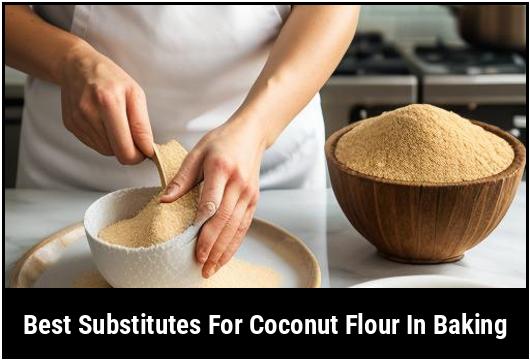
Coconut flour has gained popularity in recent years due to its gluten-free nature and high nutritional value. It is a versatile ingredient that is commonly used in baking for its unique flavor and ability to absorb liquid. However, there may be instances when you run out of coconut flour or need to avoid it due to allergies or dietary restrictions. In such cases, it is essential to know the best substitutes for coconut flour in baking that can yield similar results.
Key Takeaways
- Coconut flour is a gluten-free and nutrient-rich alternative to regular flour in baking.
- Substituting coconut flour may be necessary due to allergies, dietary restrictions, or simply running out of it.
- Almond flour, oat flour, and tapioca flour are excellent substitutes for coconut flour in baking.
- Each substitute has its unique flavor, texture, and properties, so choosing the right one for your recipe is crucial.
Why You Need A Substitute For Coconut Flour In Baking
There are several reasons why you may need to find a substitute for coconut flour in your baking endeavors:
- Allergies or dietary restrictions: Coconut allergies are not uncommon, and some individuals may need to avoid coconut flour for personal health reasons. In such cases, finding suitable alternatives becomes essential.
Pro tip: If you have a coconut allergy, it is essential to check labels carefully, as some alternative flours may still be produced in facilities that handle coconut products.
- Availability: Coconut flour may not be readily available in all stores, especially in some regions or smaller towns. Consequently, it becomes necessary to find alternative flours that can be more easily obtained.
Pro tip: If you cannot find coconut flour locally, consider searching for it online or at specialty health food stores.
- Preference for different flavors: Coconut flour has a distinct flavor that may not appeal to everyone. If you prefer a different taste profile in your baked goods, substituting coconut flour with other alternatives can help achieve the desired flavor.
Pro tip: Experiment with different substitute flours to discover new flavor combinations that complement your recipes.
Types Of Substitutes For Coconut Flour In Baking
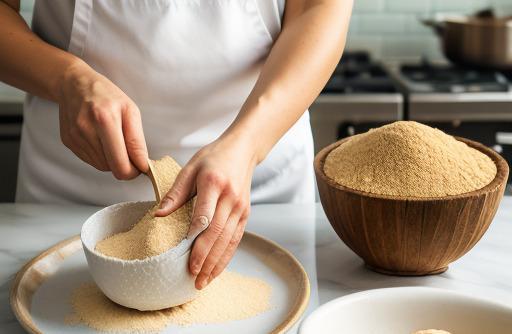
When it comes to finding suitable substitutes for coconut flour in baking, there are several options to choose from. The most common alternatives include:
- Almond Flour: Made from ground almonds, almond flour is a popular gluten-free option for baking. It has a slightly nutty flavor and a fine texture, similar to coconut flour. Almond flour works well in recipes that require moisture retention, such as muffins, cakes, and cookies.
Pro tip: Almond flour tends to be denser than coconut flour, so it is recommended to combine it with other lighter flours like tapioca or oat flour for desired results.
- Oat Flour: Made from finely ground oats, oat flour is another gluten-free option that can be used in place of coconut flour. It has a mild, slightly sweet flavor and a lighter texture. Oat flour works well in recipes that require a fluffy and moist consistency, such as pancakes, waffles, and bread.
Pro tip: To make oat flour at home, simply grind rolled oats in a blender or food processor until they reach a fine powder consistency.
- Tapioca Flour: Derived from the cassava root, tapioca flour is a starchy flour that adds tenderness and elasticity to baked goods. It has a neutral flavor and a smooth texture. Tapioca flour works well in recipes that require a chewy texture, such as bread, pizza dough, and pie crusts.
Pro tip: To prevent a gummy texture, combine tapioca flour with other gluten-free flours like almond or oat flour when using it as a substitute for coconut flour.
- Rice Flour: Rice flour is made from finely ground rice and is commonly used in gluten-free baking. It has a neutral flavor and a light texture, making it suitable for a wide range of recipes. Rice flour works well in recipes that require a tender and delicate crumb, such as cakes, muffins, and cookies.
Pro tip: Brown rice flour will add a nuttier flavor and denser texture compared to white rice flour, so choose accordingly based on your recipe requirements.
Best Substitutes For Coconut Flour In Baking
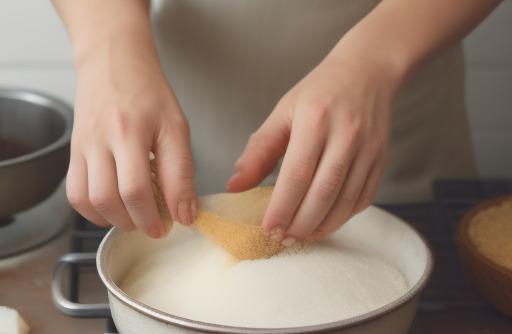
Now that we have explored the different types of substitutes, let’s dive into the best substitutes for coconut flour in baking:
- Almond Flour: As previously mentioned, almond flour is an excellent substitute for coconut flour. Its fine texture and slightly nutty flavor make it a versatile option for a variety of recipes. Use a 1:1 ratio when substituting almond flour for coconut flour in baking recipes.
Pro tip: Due to the denseness of almond flour, it’s recommended to combine it with other lighter flours like tapioca or oat flour to achieve a more balanced texture.
- Oat Flour: Oat flour is another great substitute for coconut flour. It provides a moist and fluffy texture to baked goods. Use a 1:1 ratio when substituting oat flour for coconut flour in baking recipes.
Pro tip: Oat flour absorbs more moisture than coconut flour, so you may need to increase the liquid content slightly if using it as a substitute.
- Tapioca Flour: Tapioca flour works well as a substitute for coconut flour, especially in recipes that require a chewy texture. Use a 1:1 ratio when substituting tapioca flour for coconut flour in baking recipes.
Pro tip: As tapioca flour can create a gummy texture if used in excess, it’s recommended to combine it with other flours like almond or oat flour to achieve a better consistency.
- Rice Flour: Rice flour is a versatile substitute for coconut flour and can be used in a variety of recipes. Use a 1:1 ratio when substituting rice flour for coconut flour in baking recipes.
Pro tip: Brown rice flour will add a nuttier flavor and denser texture compared to white rice flour, so choose accordingly based on your recipe requirements.
Choosing The Right Substitute For Coconut Flour In Baking
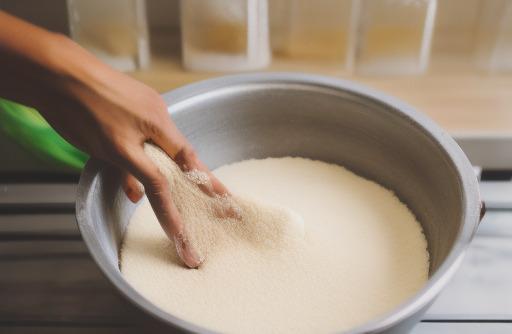
Choosing the right substitute for coconut flour depends on several factors, including the flavor, texture, and properties you desire in your finished baked goods. Here are some tips to help you make the best choice:
-
Consider the flavor: If you enjoy the slightly nutty taste of coconut flour, almond flour would be an excellent substitute due to its similar flavor profile. However, if you prefer a more neutral taste, tapioca or rice flour might be better options.
-
Texture matters: Coconut flour has a unique ability to absorb liquid, resulting in a dense texture. If you want to replicate this texture, almond or tapioca flour would be suitable substitutes. If you prefer a lighter and fluffier texture, oat or rice flour would be better choices.
-
Recipe characteristics: Consider the recipe you are making and how the different substitute flours will impact it. For example, if you are making bread, tapioca flour would help add chewiness to the dough. If you are making cakes or cookies, almond or oat flour would provide moisture and structure.
-
Experiment and adjust: Baking is a science, but it also allows for some experimentation. Don’t be afraid to try different combinations of substitute flours until you find the one that yields the desired results. Keep notes on the ratios and adjustments you make, so you can replicate successful bakes in the future.
Cooking With Substitutes For Coconut Flour In Baking
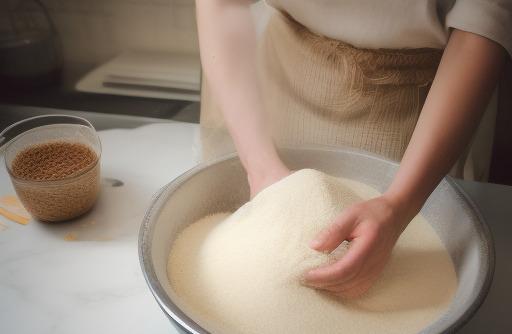
When using substitutes for coconut flour in your baking recipes, it is important to keep in mind some considerations to ensure successful outcomes:
-
Adjust the liquid content: Coconut flour has a high absorbency rate, so when using substitutes, you may need to adjust the liquid content in your recipe. Start by using the same amount of liquid as your original recipe calls for, and add more as needed until you achieve the desired consistency.
-
Combine with other flours: To achieve a balanced texture and flavor, it is often best to combine substitute flours with one another. For example, using a combination of almond flour and tapioca flour can help mimic the texture of coconut flour more effectively.
-
Monitor baking time: Coconut flour tends to require longer baking times due to its moisture-absorbing properties. When using substitutes, the baking time may vary, so keep a close eye on your baked goods while they are in the oven. Use a toothpick or cake tester to check for doneness.
Recipes Using Substitutes For Coconut Flour In Baking
Here are a few delicious recipes that make use of substitutes for coconut flour:
- Almond Flour Chocolate Chip Cookies:
-
Ingredients:
- 3 cups almond flour
- 1/2 cup sugar
- 1/2 cup softened butter
- 2 eggs
- 1 teaspoon vanilla extract
- 1/2 teaspoon baking soda
- 1/4 teaspoon salt
- 1 cup chocolate chips
-
Instructions:
- Preheat your oven to 350°F (175°C) and line a baking sheet with parchment paper.
- In a mixing bowl, cream together the softened butter, sugar, eggs, and vanilla extract until well combined.
- In a separate bowl, whisk together the almond flour, baking soda, and salt.
- Gradually add the dry ingredients to the wet ingredients, mixing until a dough forms.
- Fold in the chocolate chips.
- Using a cookie scoop or spoon, drop rounded tablespoons of dough onto the prepared baking sheet, spacing them apart.
- Bake for 12-15 minutes or until golden brown around the edges.
- Allow the cookies to cool on the baking sheet for a few minutes before transferring them to a wire rack to cool completely.
- Oat Flour Blueberry Muffins:
- Ingredients:
- 2 cups oat flour
- 1/3 cup sugar
- 1 tablespoon baking powder
- 1/4 teaspoon salt
- 1 cup milk
- 1/4 cup melted butter
- 1 egg
- 1 teaspoon vanilla extract
- 1 cup fresh or frozen blueberries
- Instructions:
- Preheat your oven to 375°F (190°C) and line a muffin tin with paper liners.
- In a mixing bowl, whisk together the oat flour, sugar, baking powder, and salt.
- In a separate bowl, whisk together the milk, melted butter, egg, and vanilla extract.
- Gradually add the wet ingredients to the dry ingredients, stirring until just combined.
- Gently fold in the blueberries.
- Divide the batter evenly among the prepared muffin cups, filling each about 3/4 full.
- Bake for 18-20 minutes or until a toothpick inserted into the center of a muffin comes out clean.
- Allow the muffins to cool in the tin for a few minutes before transferring them to a wire rack to cool completely.
Storage And Shelf Life Of Substitutes
It is important to store substitute flours properly to maintain their freshness and quality. Here are some guidelines:
-
Almond Flour: Store almond flour in an airtight container in a cool, dry place. It will remain fresh for up to 6 months, but for longer shelf life, you can store it in the refrigerator or freezer.
-
Oat Flour: Keep oat flour in an airtight container in the refrigerator to extend its shelf life and prevent it from going rancid. It should remain fresh for up to 3 months.
-
Tapioca Flour: Tapioca flour should be stored in an airtight container in a cool, dry place. It has a long shelf life and can remain fresh for up to 2 years if stored properly.
-
Rice Flour: Store rice flour in an airtight container in a cool, dry place. It will remain fresh for up to 6 months at room temperature. For longer shelf life, refrigerate or freeze the flour.
Conclusion
While coconut flour offers unique characteristics to baked goods, there are several effective substitutions available for those who cannot or prefer not to use it. Almond flour, oat flour, tapioca flour, and rice flour are versatile options that can be used in various recipes. Consider the flavor, texture, and properties desired for your specific recipe to choose the best substitute. Remember to adjust the liquid content and baking time as needed when using substitute flours. With these alternatives and a few delicious recipes in your repertoire, you can confidently bake without coconut flour while still achieving delectable results. So go ahead, explore the world of coconut flour substitutes, and enjoy your baking adventures!
FAQS
What Are The Common Substitutes For Coconut Flour In Baking?
Some common substitutes for coconut flour are almond flour, tapioca flour, arrowroot flour, chickpea flour, and oat flour.
How Does Almond Flour Compare To Coconut Flour?
Almond flour is a great substitute for coconut flour, as it is high in protein, healthy fats, and fiber. However, it differs in texture, taste, and density, so you may need to adjust your recipe accordingly.
Can Tapioca Flour Be Used As A One-to-one Substitute For Coconut Flour?
No, tapioca flour cannot be used as a one-to-one substitute for coconut flour, as it has a different texture and absorbency. You may need to use less tapioca flour and combine it with other flours to achieve the desired consistency.
Is Arrowroot Flour A Good Substitute For Coconut Flour?
Arrowroot flour can be used as a substitute for coconut flour, as it has a similar texture and can be used as a thickener in baking. However, it is not low-carb and may have a slightly different taste.
Can You Substitute Chickpea Flour For Coconut Flour?
Chickpea flour can be used as a substitute for coconut flour in some recipes, as it has a high protein and fiber content. However, it has a more savory flavor and may not work well in sweet recipes. It is recommended to use it in combination with other flours.
Sources
About the Author Jenny
I'm Jenny, a housewife with an unwavering passion for food. My culinary journey began with my grandmother's kitchen, and it's now a full-fledged food blog. I've turned my love for cooking into a creative outlet, sharing recipes and stories with a global community of fellow food enthusiasts. It's proof that being a housewife can also mean pursuing your passions and savoring life's delectable moments.
